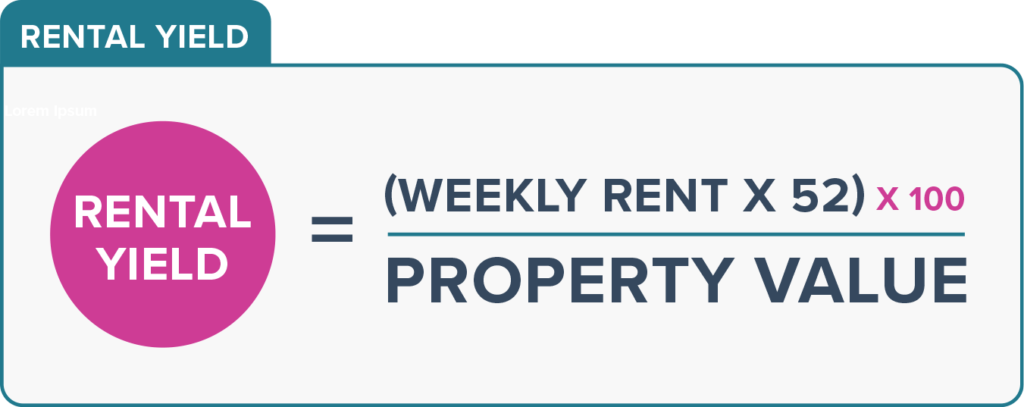The yield on any investment usually refers to how much money it makes each year as a percentage of the amount invested. This percentage sometimes includes any increase in value, as well as the interest or other income generated by the investment.
But when it comes to a property investment, yield usually considers the rental income only – not any increase in value (capital gain). In other words, it usually refers only to rental yield.
How to calculate the yield on rental property
When looking forward in time, rental property yield calculations make two assumptions:
- The weekly rent will stay the same all year
- Rent will be paid for 52 weeks, so there will be no vacant re-letting period
The property value used in the calculation can be either the purchase price or the current market value. The purchase price might be used by an investor who wants to calculate the yield based on their original investment. Market value is often used when comparing one property with another, perhaps to inform a property investment decision.
To calculate the rental yield, you simply multiply the weekly rent by 52 to get the annual rental income, divide the answer by the property value, then multiply that answer by 100 to get a percentage.
Basic rental income yield calculation

Example: If a property valued at $700,000 is rented for $500 a week, its rental yield will be 3.71%.
- The annual rental income is $500 x 52 weeks = $26,000
- The yield is $26,000 / $700,000 = 0.0371 or 3.71%
Quick 5% rental yield calculation
When you need to move fast or are making a broad plan for property investment, there’s a quick way to calculate the weekly rent required for a 5% rental yield, assuming 50 weeks’ rent a year. You simply divide the property’s value by 1000, or remove the last three digits.
So, to have a 5% rental yield the $700,000 property above would need to attract $700 a week in rent, a $750,000 property would need $750 a week in rent and so on.
This 5% yield calculation can be handy for quickly comparing different investment properties, before deciding whether to make more detailed calculations.
Net rental yield vs gross rental yield
You may have noticed that the yield calculations above make no mention of the annual expenses involved in owning an investment property. That’s why they’re sometimes called ‘gross rental yields’. They simply provide a rough way to compare properties.
When annual expenses are subtracted from the annual rental income, the resulting yield is known as the ‘net rental yield’. It’s important to take expenses into account, because they can vary considerably between different locations and property types.
Rental property expenses usually include:
- Council rates
- Landlord insurance
- Repairs and maintenance allowances
- Fixed water rate (not based on water use)
- Fees charged by a rental property management company, if you’re using one
- Body corporate fees if any – usually for apartments and units, or townhouses on shared land
Expenses that are not included when calculating net yield include:
- Mortgage interest
- Income tax (on rent less claimable expenses)
Why is knowing net rental yield important?
Net rental yield gives you some idea of how much cash your rental property might provide for repaying what you owe on the mortgage, or for something like a retirement income.
If you don’t include the mortgage interest as one of the expenses, the resulting net yield will show you whether the investment property will cover its regular mortgage payments. If the yield is low, you may have to contribute to the mortgage payments yourself. If the yield is high enough, you may be able to repay your mortgage faster and save thousands in interest, or it may provide you with an income.
More expensive properties tend to have a low yield, but this is offset by a history of higher capital gain. A costlier rental property could provide you with more wealth over time, provided you can afford to contribute to the expenses not covered by the low yield.
Less expensive properties in good areas tend to have a higher yield, but a history of lower capital gain. They often suit investors with a low deposit and high mortgage repayments, or those looking for a regular income from the investment.
Rental yield and mortgage applications
When considering your mortgage application, most lenders only count about 70% of the expected rent as income. They set aside the other 30% for approximate expenses (not including mortgage interest) and the chance that your property might not be rented for a full 52 weeks a year.
For example, if your property is expected to earn $800 a week in rent or $800 x 52 = $41,600 a year, most lenders would treat that as a before-tax income of $41,600 x 0.70 = $29,120.



